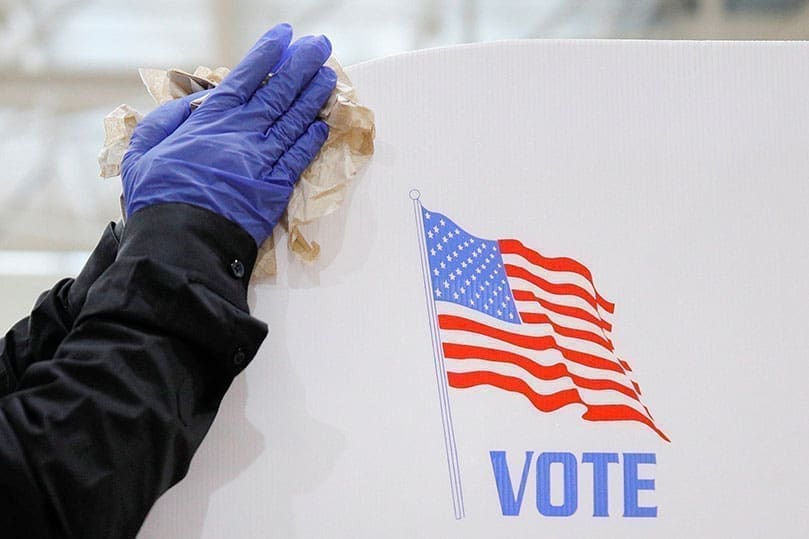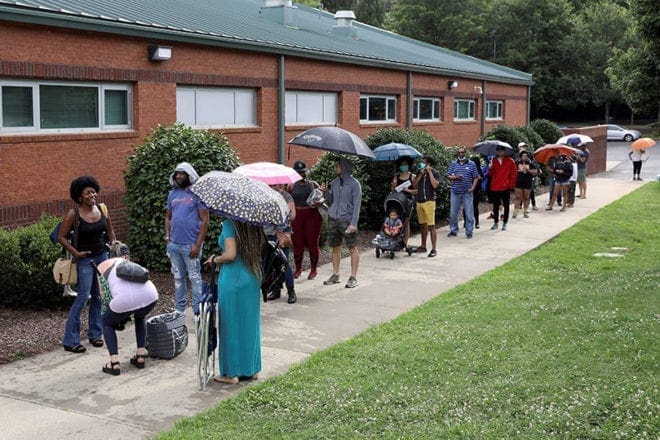 CNS photo/Tom Brenner, Reuters
CNS photo/Tom Brenner, ReutersAtlanta
Church views voting as a moral obligation
By SAMANTHA SMITH, Staff Writer | Published August 6, 2020 | En Español
ATLANTA–As elections draw near, Catholics are reminded by the church that voting is considered a moral obligation.
Faith causes us to speak up and speak out when there are policies that are either unfair, discriminatory or just need to be changed because times have changed, said Kat Doyle, director of Justice and Peace Ministries for the Archdiocese of Atlanta.
“The way that we live our faith in the public square is predominantly through voting,” she said.
The seven themes of Catholic social teaching explain how the faithful are to exist in the world, care for the most vulnerable and fight for human dignity. In his apostolic exhortation, “Evangelii Gaudium,” Pope Francis wrote, “No one can demand that religion should be relegated to the inner sanctum of personal life, without influence on societal and national life, without concern for the soundness of civil institutions, without a right to offer an opinion on events affecting society.”
The Georgia primary election runoff will be Aug. 11, with early voting ending Aug. 7. To vote in the Nov. 3 general election, Georgians must register to vote by Oct. 5. Early voting for the general election will be Oct. 12-30. Absentee ballots may also be requested.
To help navigate the process in response to the faith’s call of action, the U.S. Conference of Catholic Bishops (USCCB) released “Forming Consciences for Faithful Citizenship.” In February, complementary videos in four languages were released on YouTube to help voters. The USCCB also launched the “Civilize It” campaign in late 2019, asking Catholics to pledge civility, clarity and compassion in their families, parishes and communities in the public square.
The Catholic Church does not support specific candidates or political parties but does speak out on issues and legislation related to its beliefs.
Lisa Berkley, parishioner at Our Lady of Lourdes Church in Atlanta, has been working in Georgia polling places for more than 20 years. She enjoys helping people navigate the voting process.
“Over the years I’ve noticed the touch screens can be intimidating to our elders, so I pride myself on helping our elders use the voting equipment when they come out to vote,” said Berkley. “Just to see the expression on their faces when they’ve mastered it on their own is priceless.”
To vote in Georgia, a person must be 18, a U.S. citizen and legal resident of a county, among other qualifications. You can register to vote online or by mail. To participate in the upcoming elections, registered voters can do early in-person voting, request and return an absentee ballot or vote in person on election day at an assigned voting precinct.

Young voters line up to cast their ballots outside of an Atlanta polling location during the Georgia primary election June 9. CNS Photo/Dustin Chambers, Reuters
The Nov. 3 general election will include candidates for president and vice president of the United States, members of Congress, the Georgia General Assembly, city and county offices and proposed constitutional amendments.
Study the options
While the presidential and vice presidential candidates will get a lot of attention, it is important for voters to vote all the way down the ballot, said Frank Mulcahy, executive director of the Georgia Catholic Conference. Other races, especially the Georgia General Assembly, include candidates that will vote on all kinds of laws, he said.
“Take the time in advance to study the people you’re going to be voting for,” said Mulcahy. This includes not only candidates, but also constitutional amendments. He suggests reading local newspapers for information on Georgia-specific candidates and issues. More information is available closer to election day. For national races such as president and vice president, information is more accessible, he said.
Voters must really look at the candidates, even if you don’t like any of them, reminded Doyle.
“We have to resist the temptation to just throw in the towel and say, ‘I’m not going to participate because I don’t like my choices,’” she said.
Doyle also encourages Catholics to consider becoming candidates themselves.
“We don’t have enough people of the Catholic faith who are running for office these days,” she said. There are many Catholics who have the abilities, knowledge and understanding of what our faith calls us to do, said Doyle.
“If you just have had it with your local candidates, consider being a candidate yourself,” she said.
Remember that being involved in politics does not end on election day.
“Follow up and see if they’re doing what they said they were going to do,” said Mulcahy.
Watch and attend town hall meetings, ask questions and schedule meetings with your legislator, he said.
Part of being present and living our faith in the public square is making sure those we elect know if we agree and disagree with what they are doing, said Doyle. She explained that boycotts and protests may be needed at times, but it’s important to have civil dialogue.
“Our faith is part of who we are,” said Doyle. “And, in fact, we are called as Catholics to be active and to live our faith in the public square.”
To check your voter registration status or to register, visit registertovote.sos.ga.gov.